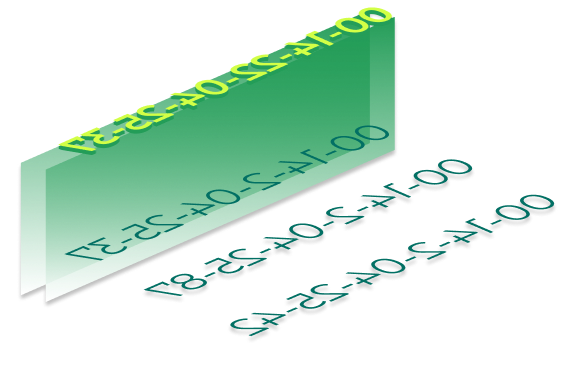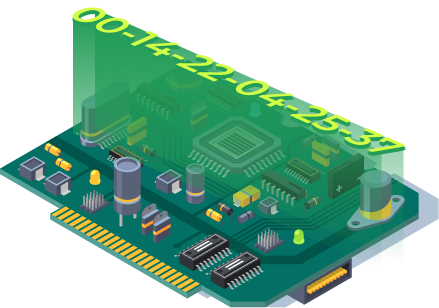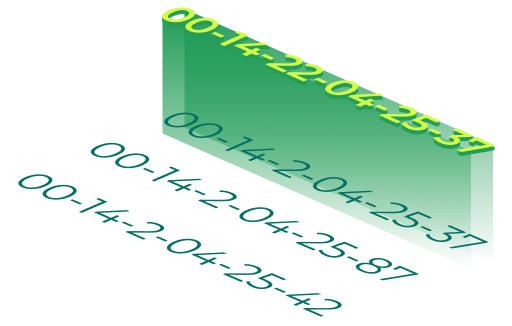MAC Address Generator

MAC Address Generator
With our MAC address generator, you can quickly create random MAC addresses.
There are different settings that you can adjust before generating the addresses to make sure they are according to your preference and requirement. You can choose between various address formats, and you can also specify whether the address should be in UPPERCASE or lowercase.
You can use these MAC addresses for different purposes. For example, they can be used to check network security and load testing. The addresses can simulate devices in these scenarios and save you the hassle of getting actual ones.

How to Use Our Random MAC Address Generator?

Moving on, let’s take a look at how you can use our tool. The steps involved are very easy and straightforward.
- Load our MAC Address Generator tool.
- Add the address prefix if required. (This is optional, and the field can be left as is.)
- Choose the address format by clicking on the drop-down menu. (There are four formats that you can pick from.)
- Choose whether the address will be in uppercase or lowercase.
- Set the number of addresses that you want to generate.
- Click on the “Generate” button.
- Once the addresses are provided, click on the “Download” button to save them to your local storage or click on the “Copy” button to copy them to your clipboard.
What are the main features of Our Random MAC Address Generator?

Here are several reasons why you should pick and use our random MAC address generator.
Easy and efficient to use:
The first reason that you should use our tool to create MAC addresses is because it is very easy and efficient. The steps required to make the addresses are very simple and straightforward. All you have to do is specify the settings and then click on the “Generate Button.”
You can make as many addresses as you want, and this is what makes our tool efficient. There are no limits that you have to worry about nor are there any requirements to sign up, etc.
Multiple address formats available:
There are different ways in which MAC addresses can be written. The groups of numbers can be separated using a colon, period, or hyphen. They can also be written collectively together with no separation. Our tool supports all of these different formats, and you can choose between them according to your requirement.
Address Generation in Bulk:
With our MAC address-generating tool, you can create up to 50 addresses in one go. You can set the required number in the “Limit” field.
If you are creating MAC addresses for testing purposes, you may need to get lots of them in order to simulate a large number of devices. Our tool helps with this by allowing bulk address generation.
Downloading Option:
Once the addresses are generated, you can click on the “Download” button to save them all to your device in JSON or CSV format. Instead of wasting time copying and pasting each of the addresses manually in a file to preserve them, you can use this feature to save time.
-
Uses of Our Random MAC Address Generator
There are various reasons for using a MAC address generator. Here are some of the main ones.
- Testing is a major use for our MAC address generating tool. If you are testing a network or a cybersecurity scenario where you need random addresses to represent devices, you can use our tool. You can create multiple addresses in just a click.
- Apart from testing, another helpful use for our MAC address generator is for educational purposes. If you are teaching someone about MAC addresses and the format they usually follow, you can use our generator to create a few different examples. Thanks to the examples, you will be able to make your explanation more illustrative and easier to understand
MAC Address Format
MAC Addresses are written in the form of 12-digit strings that contain hexadecimal numbers (0 – 9 and A – F). The string is divided into six groups of two letters each, and are separated by either colon, a hyphen, or a period. Sometimes, the address is in the form of a single string without any separation.
Each of these groups of two is known as an octet. Here is an example of a MAC address:
BA-20-C1-AD-7D-6A
The above mentioned address is in Hyphen-Hexadecimal notation. The other usually written formats are
Colon-Hexadecimal notation = BA:20:C1:AD:7D:6A
Period-separated Hexadecimal notation = BA.20.C1.AD.7D.6A
Sometimes, the MAC address is in the form of a single string without any separation.
Each of groups of two in MAC Address is known as an octet. The first three octets (BA-20-C1) of the MAC address are collectively known as the Organizationally Unique Identifier (OUI). They are unique and specific to the manufacturer of the Network Interface Card (NIC) that is present in a computer system.
The last three octets (AD:7D:6A) of the MAC address are specific to the particular NIC of the device. They are the unique identifier of the device itself. The last part is different in every address.






Frequently Asked Questions (FAQs)
Why would I need a MAC address generator?
There are many cases in which you require a MAC Address Generator. It can be utilized for network testing, troubleshooting, privacy protection, and configuring virtual machines or emulated environments requiring unique MAC addresses.
Is it legal to generate MAC addresses?
Generally, generating MAC addresses for personal or internal use is legal. However, you should make sure that you don’t utilize them for any unethical purposes.
Are the MAC addresses generated by the tool unique?
Yes, MAC addresses generated by the generator are intended to be unique. The generator employs algorithms or mechanisms to ensure that newly generated MAC addresses are highly unlikely to conflict with existing ones.